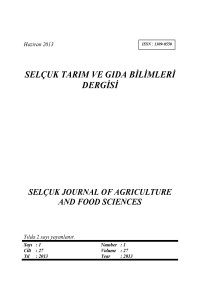Abstract
The aim of the study was to determine the effects of various bacteria applications on the nutrient content of cucumber. The Sandes F1 cucumber variety was used as plant material. Total of 7 applications were consisted of N-52/1, N-17/3, FE-43, F-21/3, 637 Ca, MfdCa1 bacteria races and control. According to the result of study, FE-43 and N-17/3 applications showed a yield increase of 11 % (12545 kg/da) and 6 % (12002 kg/da) compared to control, respectively. The result of the roots, leaves and fruits analysis showed that the highest N rate (%) was on the MfdCa1 bacteria race, while minimum rate was taken from the N-52/1 bacteria race. Total P (%) and K (%) rates gave similar results with the rate of N. The highest Ca rates in the leaf were obtained from the MfdCa1 bacteria race, and the highest Ca rates in the stem and fruit were obtained from the Fe-43 bacteria race. Total Mg (%) rate was taken from the application of the MfdCa1 bacteria race. The bacteria race of 637 Ca showed the best result in terms of total S (%) rate. From micro-elements, the best result for Fe (ppm) was observed from the N-17/3 bacteria race, Mn and Zn (ppm) were taken from control application, Cu (ppm) in the root gave the highest results from the MfdCa1 bacteria race, Cu (ppm) in the leaf was in the F-21/3 bacteria race, Cu (ppm) in the fruit was taken from the bacteria race of N-52/1, and the highest B (ppm) content was taken from the MfdCa1 bacteria race. As a result, applications of different bacteria in cucumber revealed different results. The best results in terms of macro and micro nutrients were obtained from the bacteria race of MfdCa1, hence it is considered to be used in the cucumber production.
Keywords
Abstract
Araştırmada farklı bakteri uygulamalarının hıyarın besin elementi içeriği üzerine etkileri belirlenmeye çalışılmıştır. Bitkisel materyal olarak Sandes F1 hıyar çeşidi kullanılmıştır. Denemede N-52/1, N-17/3, FE-43, F-21/3, 637 Ca, MfdCa1 ve kontrol olmak üzere toplam yedi bakteri uygulaması yapılmıştır. Araştırma sonucunda kontrolden 11237 kg/da verim alınırken, FE-43 bakteri uygulaması kontrole göre % 11 (12545 kg/da), N-17/3 bakteri uygulaması % 6 (12002 kg/da) gibi bir verim artışortaya koymuştur. Kök, yaprak ve meyvelerde yapılan analizler sonucunda, en yüksek N (%) içeriği MfdCa1 bakteri uygulamasından elde edilirken, en düşük değer N-52/1 bakteri uygulamasından elde edilmiştir. Toplam P (%) ve toplam K (%) miktarı da N ile paralellik göstermiş olup en iyi sonuç MfdCa1 bakteri uygulamasından elde edilmiştir. Ca (%) miktarına bakıldığında yapraktaki en yüksek Ca MfdCa1 bakteri uygulamasından elde edilirken, kök ve meyvedeki en yüksek Ca Fe-43 bakteri uygulamasından elde edilmiştir. Toplam Mg (%) miktarı bakımından MfdCa1 bakteri uygulamasından en iyi sonuç alınmıştır. S (%) miktarına bakıldığında en iyi sonuçları 637 Ca uygulaması vermiştir. Mikro elementlere bakıldığında, Fe (ppm) N-17/3 bakteri uygulamasından, Mn (ppm) kontrol uygulamasından, Zn (ppm) kontrol uygulamasından, Cu (ppm) köklerde MfdCa1, yapraklarda F-21/3 ve meyvede N-52/1 bakteri uygulamalarından, B (ppm) MfdCa1 bakteri uygulamasından en yüksek sonuçları vermiştir. Sonuç olarak hıyarda yapılan farklı bakteri uygulamaları farklı sonuçlar ortaya koymuştur. Makro ve mikro besin elementleri yönünden en iyi sonuçları MfdCa1 bakteri uygulamasından elde edilmiş olup, hıyar yetiştiriciliğinde kullanılabilirliği düşünülmektedir
Details
| Primary Language | English |
|---|---|
| Subjects | Horticultural Production |
| Journal Section | Research Article |
| Authors | |
| Publication Date | June 25, 2013 |
| Submission Date | December 10, 2012 |
| Published in Issue | Year 2013 Volume: 27 Issue: 1 |
Selcuk Agricultural and Food Sciences is licensed under a Creative Commons Attribution-NonCommercial 4.0 International License (CC BY NC).


